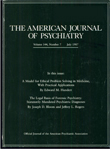This book is an outstanding contribution to the psychiatric literature that summarizes many important issues related to the diagnosis and treatment of combat-related psychiatric disorders in the Gulf War. The editors all have special expertise in military medicine and military psychiatry. Dr. Martin served as a mental health officer in the Second Armored Cavalry Regiment during the Gulf War and coauthored five of the 16 chapters in this book. Ms. Sparacino is an accomplished medical editor with special expertise in the field of military psychiatry. Dr. Belenky is a well-known authority in the field of military psychiatry and combat-related psychiatric conditions who is still on active duty as Director of the Division of Neuropsychiatry at the Walter Reed Army Institute of Research. He also served in the Gulf War as a mental health officer in the Second Armored Cavalry Regiment.
The book begins with a fascinating historical review of psychiatric disorders that frequently occur in combat. Dr. Robert T. Joy is one of the world's experts in military medical history and currently chairs the department of military history at the Uniformed Services University of the Health Sciences in Maryland. His foreword gives a wonderful overview of the evolution of psychiatric combat disorders. An equally fine contribution is that of Dr. Faris Kirkland, a military historian with extensive combat experience in Vietnam. He summarizes the military situation in the Gulf War for the general reader in a succinct yet understandable fashion. Both of these contributions set the stage for the book and are essential reading before examining any specific chapters.
The book is organized in a logical fashion into three parts: Mental Health Services and the Theatre of Operations, Coping With the Experience of Combat, and Assessing the Gulf War Experience. The initial chapters in the first section focus on global mental health issues in the theater of operations and in Europe, whereas the later chapters focus on corps and divisional combat psychiatry issues. There is also a chapter that discusses the Navy's contribution to combat psychiatry for marine forces who are involved in combat. The editors were able to attract as authors individuals who were involved in the design and implementation of the various systems that are discussed in individual chapters.
The second section of the book, on coping with the experience of combat, moves from organizational issues to the individual responses of soldiers and sailors to combat. Chapters include information on the role of critical incident stress debriefings and battle reconstructions to deal with combat-related stress reactions. There is a chapter on how survivors of a SCUD missile attack responded and were treated. Another chapter discusses a specific incident related to stress debriefings following death from unexploded ordinance and how sailors reacted to an accident on a naval ship that resulted in the death of a number of their co-workers. Finally, there is a chapter that discusses the important role of occupational therapy.
Two chapters in the final section include lessons learned from the Persian Gulf War: the importance of unit cohesion and the need for the organization and training of mental health professionals to provide appropriate support and treatment of military personnel in future combat situations. The last chapter, by Drs. Belenky and Martin, discusses their perspective on how mental health teams will be organized for future operations: small, multidisciplinary, and mobile operational units to provide direct support to individual soldiers in small units.
The Gulf War and Mental Health is not for the general psychiatrist but for those many psychiatrists who work in Veterans Administration settings, who may be on active duty in the military, or who treat trauma survivors in civilian settings. Over the years, military psychiatrists have made major contributions to our understanding of posttraumatic stress disorder and acute stress reaction. This book details more recent findings. I found it to be one of the best publications to date on the role of military psychiatry in the Gulf War. Those with a special interest in military psychiatry should definitely purchase this text and review it carefully. Others wishing to have an overview of military psychiatry and its contributions to community psychiatry would also benefit from reading it. Dr. Martin, Ms. Sparacino, and Dr. Belenky should be commended for a wonderful contribution to the military psychiatry literature.

